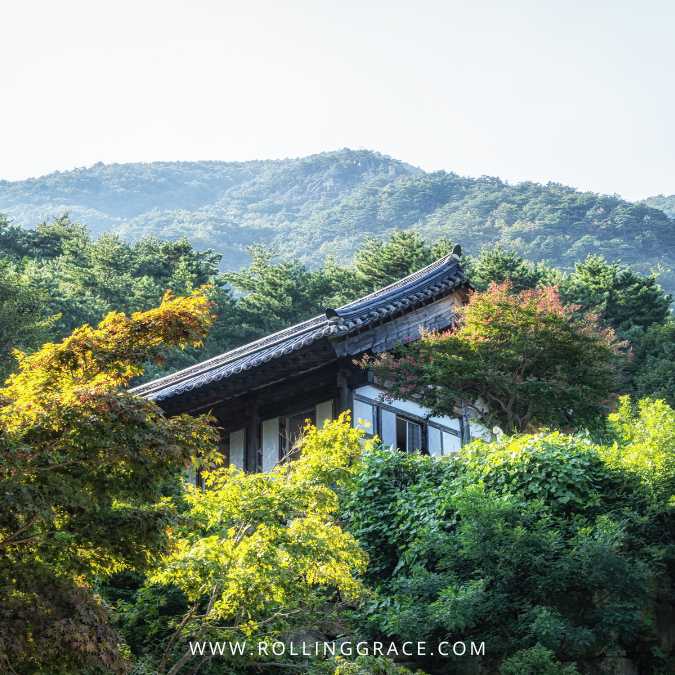Jirisan is a mountainous area in the south of South Korea. Reaching a summit of 6,283 feet, it is the second tallest mountain in the country after Hallasan on Jeju Island, and the tallest mountain on the mainland. Jirisan is home to seven significant Buddhist temples. Hwaeomsa is the largest and most well-known, housing various national treasures - notably stone artworks dating from 600 to 900 CE.
Read more: Jirisan National Park, South Korea
Table of Content
 |
| Popular Temples in Jirisan, South Korea |
Popular Temples in Jirisan, South Korea
Hwaeomsa Temple
Hwaeomsa Temple is located on the southwest corner of Jirisan Mountain. It was built in the fifth year of King Jinheung's reign during the Silla Era, but it was destroyed during the Japanese Invasion or Jeongyujaeran in 1592. The temple, including the main building Daeungjeon, was meticulously rebuilt during the Joseon Period.
The path to the temple is via the Hwaeomsa Temple Valley. It also takes you to Jirisan Mountain's Nogodan Plateau. A charming spot named Siuidongsan, which means the Hill of Poetry, with traditional Korean straw-roofed cottages and a water mill, can be found to your right on your leisurely walk to the temple.
 |
| Hwaeomsa Temple in Jirisan, South Korea |
Ssanggyesa Temple
This ancient temple in the heart of southern Jirisan was built by the revered priest Jingamseonsa after his return from the Dang Dynasty some 1,100 years ago, during King Munseong's reign. It was then devastated by the Japanese invasion but was later rebuilt.
Inside the temple, there are numerous rich cultural artefacts, including Jingamseonsa-daegongtapbi, which was penned by Choi Chiwon, a prominent Silla writer. Iljumun, a five-story stone pagoda, as well as Palsangjoen and Maaeyerae-jwasang, are also nearby. The magnificent Buril Waterfall is located not too far from the temple, making it an ideal stopover.
 |
| Daeung-jeon Hall at the Ssanggyesa Temple |
Silsangsa Temple
Located in Namwon's Sannaemyeon, Silsangsa faces the Cheonwangbong peak of Jirisan. Known as a temple of fatherland defence, it was burned to the ground during a great fire in Jeongyujaeran and afterwards reconstructed with 36 buildings during King Sukjong's reign. However, during the reign of King Gojong in the late nineteenth century, another fire broke out, and the area was again rebuilt, albeit on a smaller scale.
 |
| Silsangsa Temple in Jirisan, South Korea |
Daewonsa Temple
Daewonsa Temple was first constructed in 548 under the Silla dynasty and is situated near the eastern foot of Jirisan Mountain. It was abandoned for over a thousand years before being repaired and expanded under the name Daewon. Unfortunately, a large fire that broke out on January 12, 1914, destroyed the entire property. Yosachae and the other halls and pavilions, which together occupied 184 rooms over 12 buildings, were completely rebuilt in 1917. However, they suffered further damage during the Korean War and were left unoccupied until the end of the conflict, at which point the temple was renovated and expanded.
High hills and odd-looking rocks surround the two-kilometer-long valley that runs from the parking lot at Daewon Temple's entrance to the temple itself. Here, you can witness the unique scenery created by the clear water that seeps out of craters in the rocks. There is a myth surrounding Yongso Pond that claims that a dragon spent many centuries residing there before taking flight.
Yeongwonsa Temple
Before it was destroyed by fire, a prominent Buddhist priest erected Yeongwonsa, which had 100 chambers in nine buildings. According to folklore, a monk named Yeongwon lived in seclusion in a nearby cave for eight years. Despite this, he opted to quit because he had learned nothing. On the way down, he noticed an old man fishing in the woods, where there was no water. "I've been fishing here for eight years, and I'll catch a large fish in two years," the old guy told Yeongwon. He then vanished. Yeongwon opted to stay in the cave for another two years after this strange incident. He gained Nirvana and erected Yeongwonsa this time.
 |
| Yeongwonsa Temple in Jirisan, South Korea |
Don't forget to share your travel & dining moments with us on Instagram by tagging @rollinggrace or #RollingGrace. Happy travelling!
Popular Temples in Jirisan, South Korea
 Reviewed by Rolling Grace
on
February 01, 2023
Rating:
Reviewed by Rolling Grace
on
February 01, 2023
Rating:
 Reviewed by Rolling Grace
on
February 01, 2023
Rating:
Reviewed by Rolling Grace
on
February 01, 2023
Rating:











No comments: